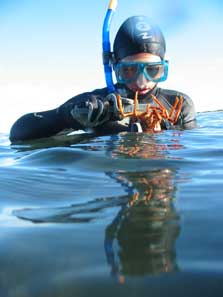Freshwater Biologist
Tasks & duties

- plan field studies and experiments
- observe marine plants and animals in their natural environment
- identify, classify and preserve different types of marine life
- examine samples in a laboratory
- study the impact of pollution on marine life
- use statistical software on computers to analyse data
- use computer modelling techniques to predict future events in the marine environment
- estimate population growth and life expectancy
- study biodiversity (the variety of species and their habitats in the sea)
- carry out field and laboratory experiments to test hypotheses
- run ongoing monitoring programmes to look for changes and trends in marine communities
- report the results of their studies in articles and scientific papers for science journals
Skills & knowledge

- knowledge of marine science, biology, and chemistry
- research skills
- skill in analysing and interpreting research results and other information
- practical skills for performing experiments and operating scientific equipment
- problem-solving skills
- planning and organisational skills
- communication skills
- writing skills, for writing reports and for publications
- maths and computer skills.
Entry requirements
To become a marine biologist you usually need to have a Masters or Doctorate in Science.
Secondary education
A tertiary entrance qualification is required to enter further training. An A or B Bursary, or NCEA equivalent, is preferred. Useful subjects include biology, chemistry, physics, English and maths with statistics and/or calculus.
Training on the job
Many skills are gained on the job. Marine biologists also attend courses and workshops to keep their skills and knowledge up to date. Their employers may offer technical training for new equipment, such as diving equipment and specialised computer software.
Related courses
Life Sciences (General)
Marine Sciences
For more information, please refer to Career Services.
Document Actions
